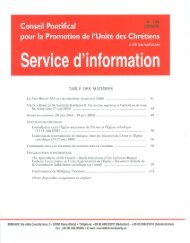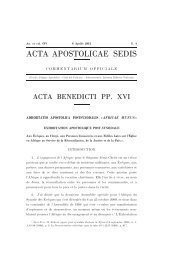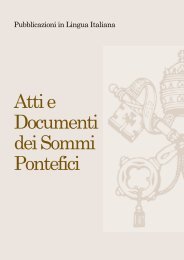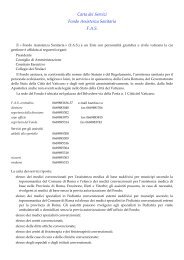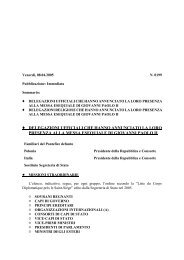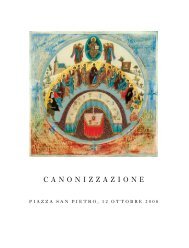ACTA APOSTOLICAE SEDIS - La Santa Sede
ACTA APOSTOLICAE SEDIS - La Santa Sede
ACTA APOSTOLICAE SEDIS - La Santa Sede
Sie wollen auch ein ePaper? Erhöhen Sie die Reichweite Ihrer Titel.
YUMPU macht aus Druck-PDFs automatisch weboptimierte ePaper, die Google liebt.
686<br />
Acta Apostolicae Sedis – Commentarium Officiale<br />
but also the existing norms of canon law (particularly canons 1717-1719), 2<br />
despite their universal applicability and despite the Congregation’s observation<br />
that the procedures established by the Code of Canon <strong>La</strong>w were to be<br />
observed. The Cloyne Report states that the Diocese did not carry out proper<br />
canonical investigations; in the five cases where an investigation was ordered<br />
under canon 1717, the investigation was commenced but never completed<br />
(1.49-1.50).<br />
The Cloyne Report notes that prior to 2005 the Diocese of Cloyne did not<br />
refer any case to the Holy See. Subsequently, on 1 December 2005, one case<br />
was referred to the Congregation for the Doctrine of the Faith (21.40), which<br />
gave its decision on 17 April 2007 (21.62). Following risk assessment of the<br />
priests involved, four additional cases were referred to the Congregation for<br />
the Doctrine of the Faith in 2009 (4.25).<br />
The Framework Document<br />
Some clarifications about the Framework Document should help to dispel a<br />
number of common misconceptions.<br />
When a number of high-profile cases of child sexual abuse perpetrated<br />
by clerics came to light in Ireland during the 1990s, the Irish Bishops’<br />
Conference established an Advisory Committee in 1994 to discuss how such<br />
2<br />
Can.1717 § 1. Whenever an ordinary has knowledge, which at least seems true, of a<br />
delict, he is carefully to inquire personally or through another suitable person about the facts,<br />
circumstances, and imputability, unless such an inquiry seems entirely superfluous.<br />
§ 2. Care must be taken so that the good name of anyone is not endangered from this<br />
investigation.<br />
§ 3. The person who conducts the investigation has the same powers and obligations as an<br />
auditor in the process; the same person cannot act as a judge in the matter if a judicial process is<br />
initiated later.<br />
Can.1718 § 1. When it seems that sufficient evidence has been collected, the ordinary isto<br />
decide:<br />
1. whether a process to inflict or declare a penalty can be initiated; 2. whether, attentive to<br />
can. 1341, this is expedient; 3. whether a judicial process must be used or, unless the law forbids<br />
it, whether the matter must proceed by way of extrajudicial decree.<br />
§ 2. The ordinary is to revoke or change the decree mentioned in §1 whenever new evidence<br />
indicates to him that another decision is necessary.<br />
§ 3. In issuing the decrees mentioned in §§ 1 and 2, the ordinary is to hear two judges or other<br />
experts of the law if he considers it prudent.<br />
§ 4. Before he makes a decision according to the norm of §1 and in order to avoid useless<br />
trials, the ordinary is to examine carefully whether it is expedient for him or the investigator,<br />
with the consent of the parties, to resolve equitably the question of damages.<br />
Can.1719 The acts of the investigation, the decrees of the ordinary which initiated and<br />
concluded the investigation, and everything which preceded the investigation are to be kept in<br />
the secret archive of the curia if they are not necessary for the penal process.



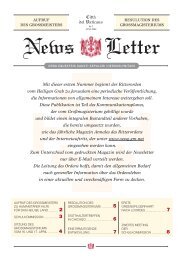
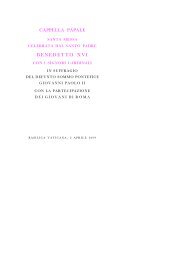
![AAS 01 [1909] - La Santa Sede](https://img.yumpu.com/51456523/1/180x260/aas-01-1909-la-santa-sede.jpg?quality=85)
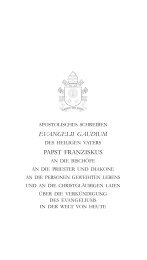
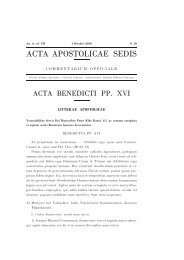
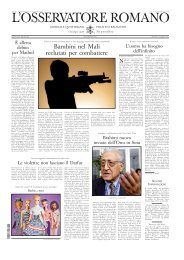
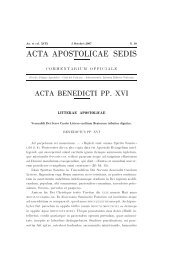
![AAS 20 [1928] - La Santa Sede](https://img.yumpu.com/19772818/1/180x260/aas-20-1928-la-santa-sede.jpg?quality=85)
